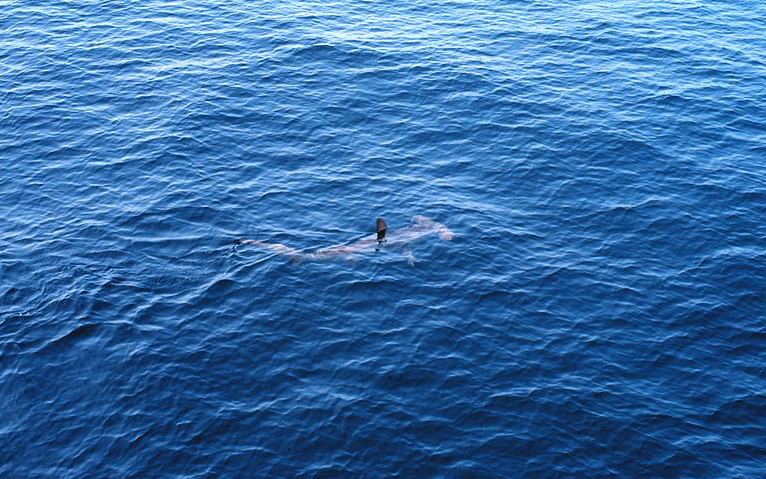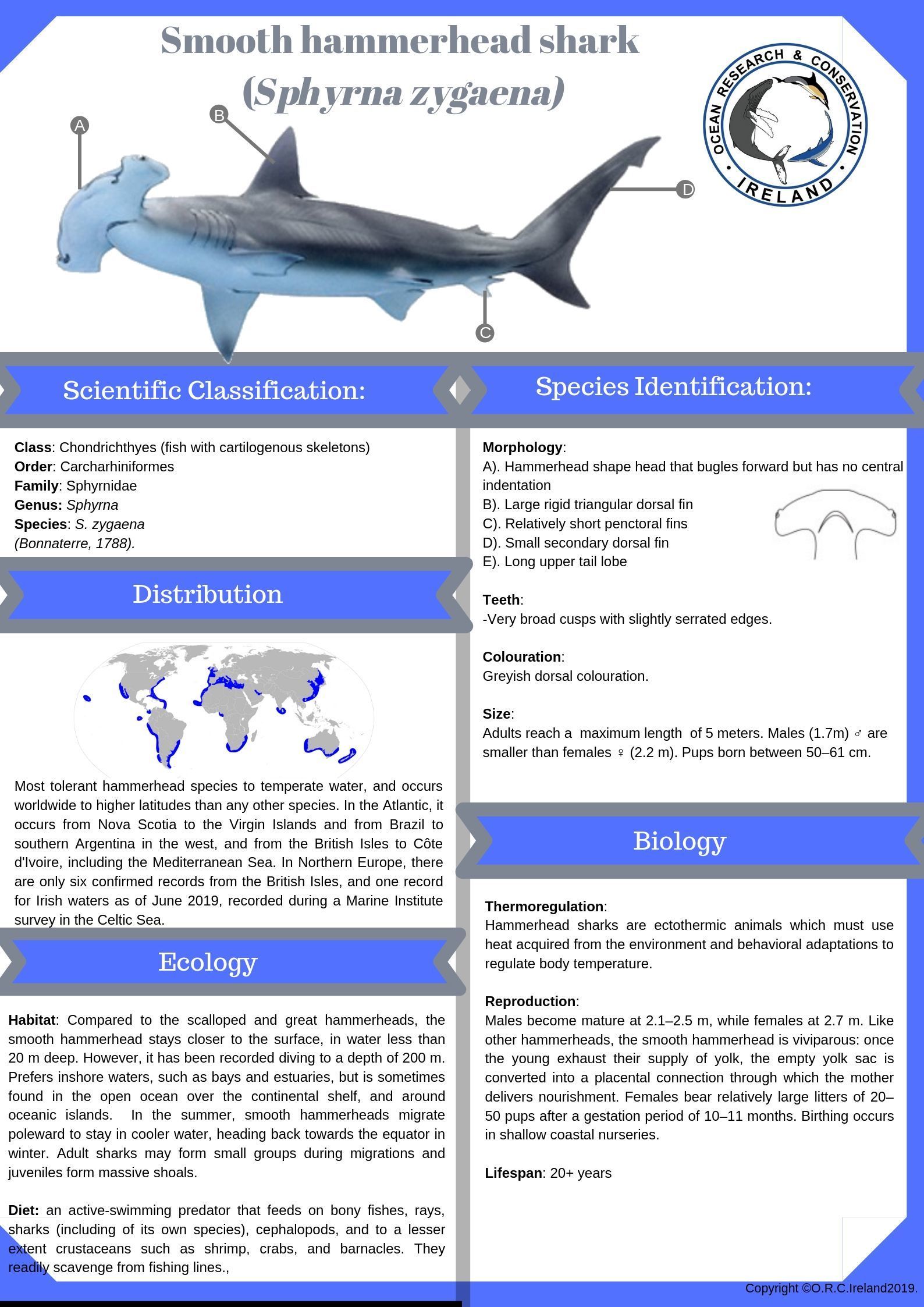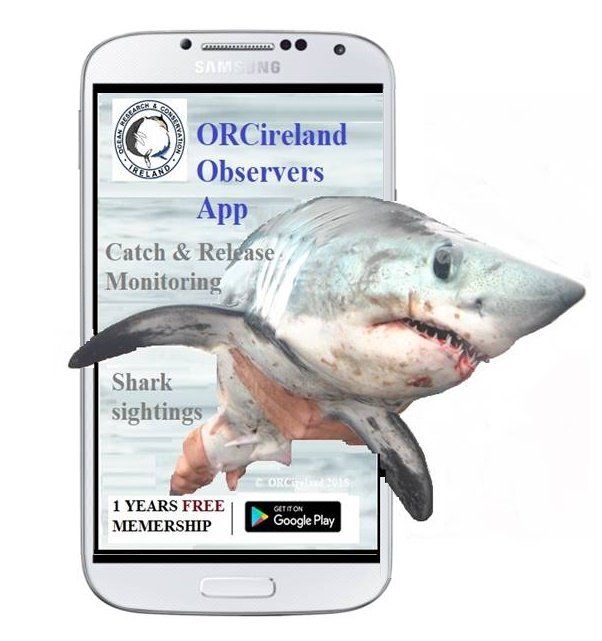Breaking** New shark species recorded in Irish waters!
To date, there have been 72 species of cartilaginous fish or elasmobranchs (shark, skates and rays) recorded in Irish waters, with a new record reported from the R.V. Celtic Explorer during WESPAS, June 2019. Within Irish territorial waters, elasmobranchs occur in every habitat, from coastal zones to the deep sea, and include highly migrant megafauna.
Smooth hammerhead shark (Sphyrna zygaena). Source: Wikicommons.
New Shark Species for Ireland:
Irish marine habitats are of key importance for up to 72 elasmobranch (shark, skate and ray) species, providing critical foraging, spawning and/or nursery grounds. Unfortunately, these waters also host some of the most intense fishing effort in Europe and many pelagic shark species recorded here are listed on the IUCN Red List as vulnerable or endangered. For example, while Ireland is considered a "hot-spot" for the porbeagle shark ( Lamna nasus ), the species has been assessed as critically endangered, while the basking shark ( Cetorhinus maximus ) was listed as endangered, and the blue shark ( Prionace glauca ) as near threatened.
A new shark species has been recorded in Irish waters. The smooth hammerhead shark ( Sphyrna zygaena) was reported in June 2019, during the Western Edge Small Pelagic Acoustic Survey (WESPAS) carried out by scientists from the Marine Institute. WESPAS is an acoustic survey of herring and boarfish stocks in the waters to the north, west and south of Ireland to determine the distribution, abundance, health and maturity, while simultaneously examining the ecology of marine mammals, seabirds, and now...sharks! The survey is carried out on an annual basis on board the Marine Institute's RV Celtic Explorer. The survey was led by Mr. Ciaran O'Donnell over two legs, from the 13th of June to the 24th of July, where a team of experienced marine biologists will continue to be on effort conducting seabird, marine mammal and fisheries data collection during survey transects deploying a pelagic trawl to ground truth echo traces of herring, boar fish and other pelagic species.
The smooth hammerhead shark is cosmopolitan semi-pelagic shark distributed worldwide in temperate and tropical waters. As most elasmobranch species, hammerheads are characterised by having slow-growth rate, late maturation and relatively low fecundity, making them particularly susceptible to mortality from by-catch in pelagic long lines targeting swordfish (Xiphias gladius
) and/or tunas ( Thunnus
spp.). The smooth hammerhead has been designated international protection in terms of trade under Appendix II of the Convention for International Trade in Endangered Species (CITES) and management regulations concerning the conservation of the species in the Atlantic Ocean, which has been developed by the International Commission for the Conservation of Atlantic Tunas (ICATT) to prohibit fishing vessels from "retaining onboard, transhipping, landing, storing, selling or offering for sale any part or whole carcass of hammerhead sharks of the family Spyhrnidae, taken in the Convention area in association with ICATT fisheries".
Species Profile:
Threats to sharks in Irish waters:
By now, we have all heard that single use plastic is a major threat to our oceans, partly driven by the success of David Attenborough's Blue Planet II series, however, consensus among the scientific community is growing that there has been too much emphasis on plastics, a convenient distraction from more pressing environmental issues, such as climate change and overfishing. In fact, a report from the Intergovernmental Panel on Climate Change (IPCC) in October 2018, detailed drastic action that is required to limit global warming to 1.5 degrees celcius. Despite the importance of this issue, much media attention has still focused on plastics and many of the public still believe that this is the biggest threat facing our planet. In 2009, a new concept to monitor the planets operating limits and the environmental threats were set which showed that three of these boundaries were already exceeded the limits. These were biodiversity loss, the nitrogen cycle and climate change. With sea temperatures set to rise, species such as hammerheads and tiger sharks have been speculated to arrive to Irish and U.K. Shores, and it is evident from recent reports that more shark species are venturing into our waters. This highlights a need to better understand sharks movement and presence, particularly in relation to sea temperature, as these generally temperature sensitive species may be indicators of climate change (Payne et al ., 2018).
With an increase in shark diversity, particularly hammerhead sharks, which are known to be vulnerable to fisheries impacts, the primary threat to sharks in Irish waters is the over-exploitation of fisheries and by-catch of sharks in pelagic fisheries that target mackerel, herring, horse mackerel, blue whiting, sprat, tunas and boar-fish. Species which have shown a decline in the North-east Atlantic, such as the porbeagle, highlighted by it's critically endangered status on the IUCN RED List, are also particularly vulnerable to un-intended by-catch in long-line fisheries, as are other large-bodied species. By-catch of pelagic sharks is prevalent in fisheries from Irish, British, French, German, Danish and Norwegian fishing fleets. Bluefin tuna ( Thunnus thynnus ) is targeted beyond the Irish EEZ by Japan and other Pacific nations, while within our territories Albacore tuna ( Thunnus alalunga) is targeted by Ireland, the U.K., France and Spain. In 2018, blue, porbeagle and short-fin mako ( Isurus oxyrinchus) were found to have been illegally finned by long-liners off the south coast.
The ecology and biology of popular angling species in Irish waters have been documented since the 19th Century, yet it was the late 1980s before fisheries impacts were first discussed (Fahy, 1988, 1989). The distribution and weights of rod-caught "specimen and record fish" have been recorded by The Irish Specimen Fish Committee since 1955 (ISFC, 2014). In the 1970's, Inland Fisheries Ireland began the on-going research programme in co-operation with angling eco-tour operators, tagging sharks through catch & release fishing charters. In addition, species such as the porbeagle shark and blue shark have been tagged with Pop-up Satellite Archival Tags (PSATs) by Inland Fisheries Ireland and University College Cork in studies that show their migratory movements and behaviour, while simultaneously recording pressure (depth) and sea temperature. (Click here to read more).
Pelagic Species in Irish waters.
Pelagic Shark Identification Key and Distribution Map with IUCN Red List Status. Source: O.R.C.Ireland.
How can you help sharks in Irish waters?
In order to better understand the ecology of elasmobranchs in Irish waters, to afford species better protections and meet international standards, scientists need to gather information on species preferred habitats and life history characteristics. Pelagic shark species frequently recorded In catch & release angling fisheries, include blue and porbeagle shark, but rare species such as the thresher shark (Alopias vulpinus) , have also been recorded through catch & release angling. Now anglers and anyone that spends time close to, or at sea, can become a citizen scientist easier than ever before with the help of the Observers App 1.0. The Observers App allows you to take a photo, get your GPS location and fill in a report of your encounter. All information on shark locations are kept private and for the purpose of scientific research only. The app also doubles as a free educational tool which allows the user to learn anything in short videos found in the education section, although we recommend the biodiversity and ecology catageories. Help us to monitor elasmobranch species through CPR (catch, photo, release), or submit records with media upload directly through the app. You will then get a place on our 'Observers Leader Board' to win great prizes. The Observers App is available for Android on Google Play or from our website www.orcireland.ie . but will be released for iOS in the coming months. If you would like to get the iOS version for iPhone, iPad or apple devices sign up to our newsletter and be the first to get a download link on its release.
Join a movement of #OceanHeroes and sign up in the members tab in the Observers App for 1 years FREE membership. Dive in and learn why sharks, being top predators, play a crucial role in marine communities structure and function and why widespread decline of sharks across the world's oceans are expected to strongly influence the equilibrium of marine ecosystems.
© Ocean Research & Conservation Ireland (ORCireland) and www.orcireland.ie , est. 2017. Unauthorized use and/or duplication of this material without express and written permission from this site’s author and/or owner is strictly prohibited. Excerpts and links may be used, provided that full and clear credit is given to Ocean Research & Conservation Ireland and www.orcireland.ie with appropriate and specific direction to the original content.
References:
Clarke, M., Farrell, E.D., Roche, W., Murray, T.E., Foster, S. and Marnell, F. (2016) Ireland Red List No. 11: Cartilaginous fish [sharks, skates, rays and chimaeras]. National Parks and Wildlife Service, Department of Arts, Heritage, Regional, Rural and Gaeltacht Affairs
. Dublin, Ireland.
Fahy, E. (1988). The spurdog ( Squalus acanthias ) fishery in south west Ireland. Irish Fisheries Investigations . B. 32 23 pp.
Fahy, E. 1989. Fisheries for skate (Batoidei) in western statistical area viia investigated through the commercial catches. I rish Fisheries Investigations .B34: 14.
SharkTrust - British Sharks. https://www.sharktrust.org/Pages/FAQs/Category/british-sharks.
SHARE THIS ARTICLE

















